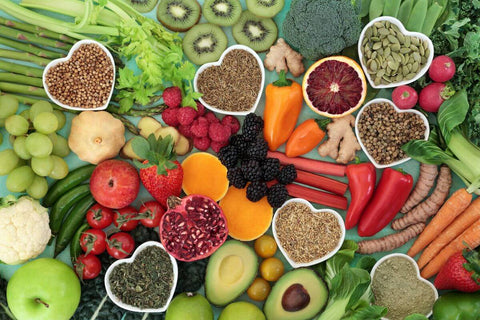Heart Health for Women in the Stages of Menopause

By Barbara Sobel, MS, CNS, LDN
Did you know that cardiovascular disease is the number one cause of death in the U.S. for both men and women? While women may have a lower risk of cardiovascular disease before menopause, that risk increases after menopause when estrogen, which is cardio-protective and anti-inflammatory, declines.
In menopause, many women also see increases in blood pressure, blood sugar, and body mass, and increases in body fat around the middle, which is associated with increased visceral fat, the fat that is stored around the organs. These are associated with an increased risk for cardiovascular disease in women.
Knowing your family history, getting regular comprehensive testing, and having frank conversations with your medical practitioner are great ways to assess your risk and treatment options. For women in perimenopause and menopause, hormone replacement therapy is something to ask about and understand how it may pertain to your symptoms, current health issues, and any potential risks.
Cardio-Protective Diets
There are a lot of diet and lifestyle habits we can use to reduce our risk and progression of vascular disease. If you go on the internet and google cardiovascular disease and diet, you will get all sorts of seemingly conflicting diets showing up — from Vegetarian to Keto, Paleo, Mediterranean, DASH, Caffeine-restricted, Intermittent Fasting, and Cardiometabolic. No one of these diets is right for everyone.
Choosing the right diet for you involves looking at your symptoms, your test results, and the principles of each of the diets that best work to support your health and how well it works for your lifestyle and motivation. Oftentimes, it is helpful to take principles from several of these diets to support your individual needs. That said, there are a few things that all of these diets have in common, and they are:
- high in fiber (RDA for fiber is 22-28 grams for women and 28-34 grams for men; for optimal blood sugar balance, the American Dietetic Association recommends 30 to 50 grams per day; our ancestors may have eaten close to 100 grams per day. Most of us eat between 12-14 grams per day. When adding fiber to your diet, do it slowly to avoid gas and bloating). Vegetables, fruits, whole grains, beans, legumes, and seeds (especially flax and chia seeds) are fiber-rich.
- include a mix of oils and fats rich in polyunsaturated fats (PUFAs) such as extra virgin olive oil, flaxseeds and flaxseed oil, walnuts, chia seeds, sesame seeds, pine nuts, and omega three fatty acids commonly found in fish including salmon, trout, mackerel, herring, anchovies, halibut, and sardines, flaxseeds, pumpkin seeds, Brussel sprouts, kale, spinach, broccoli and cauliflower
- recommend a variety of foods high in potassium, including avocado, leafy greens (spinach, beet greens, Swiss chard …), broccoli, beans and lentils, oranges, tomatoes, cashews, almonds, sweet potatoes, butternut squash, pomegranate, some fish (salmon, cod, and haddock), and everyone’s first guess — bananas
- include nuts and seeds
- celebrate foods rich in flavonoids and antioxidants found in colorful plant foods (get your spices on!)
These diets also recommend eliminating the following foods:
- processed foods
- foods high in salt
- foods high in added sugar or other sweeteners
- foods that include trans fats or partially hydrogenated oils that are added to foods such as commercial cakes, cookies, and pies, shortening, microwave popcorn, frozen pizza, refrigerated doughs, fried foods, some nondairy creamers, and margarine that were added to improve shelf life
- foods that cause inflammation in your specific body
Lifestyle Habits
Focusing on our diet is not the only thing that we can do to reduce our risk of cardiovascular disease. When we think about lifestyle habits that support vascular health, we often think of stopping smoking, balancing blood sugar, managing stress, and regular exercise and movement as helpful preventative habits.
But did you know that not getting enough good quality sleep is considered to be one of the most important lifestyle factors that contribute to the progression of atherosclerosis and cardiovascular events? A lack of social relationships has been shown to decrease mortality even more than smoking, lack of exercise, and obesity. Addressing lifestyle habits is key to building and maintaining vascular and overall health.
Know the Signs of Heart Attack
The signs are different in men and women.
Classic heart attack symptoms for both men and women include:
- Chest pain
- Pain in the jaw, neck, back, arm, or shoulder
- Shortness of breath
- Nausea or vomiting
Women are more likely to have the following symptoms, with or without chest pains. Not recognizing these symptoms can delay treatment and/or cause misdiagnosis which they delay treatment which can increase the risk of further health issues for women.
- Unusual tiredness and weakness
- Upset stomach
- Anxiety
Next Steps
As you strategize how you will reach your health goals this year, now might be a good time to check in with yourself and see if you may benefit from a diet and lifestyle upgrade to support your cardiovascular health. If you are confused or overwhelmed by what you read or feel that making changes in diet and lifestyle is overwhelming, book an exploratory call (for new clients) or a follow-up visit (for existing clients) at book an appointment so we can dive deeper together. My goal is to support you while they make changes in a doable, long-term way.



